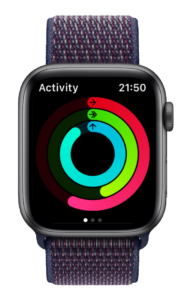When the Apple Watch first arrived, its core strength was yet to be realised. In subsequent years the health aspects have come to the fore. I’m on my fourth model now (original, Series 3, Series 5, and Series 9) and I still enjoy having it on my wrist every day, but the obvious, there-from-the-beginning activity tracking feature rarely gets my attention these days.

In a post on sleep tracking, my friend Allison Sheridan said…
Unlike losing (or gaining) weight, we don’t have empirical equations that tell us how to sleep more.
The oft-mentioned equation is “kilojoule intake versus kilojoule expenditure.” The Apple Watch promises to track your expenditure. How does it do this?
Height, gender, heart rate, and wrist movement1. Mine also has weight, but that’s not required (and I don’t know if it is used), and in later models there is an altimeter. Apple has very clever engineers and experts to be able to translate wrist movement and heart rate into an even moderately accurate measure of kilojoule (kJ) expenditure. Let’s assume for the moment that it results in a reasonable approximation. How do we apply what we now know?
Ummm… that leads us to intake tracking and this is a horrible experience unless you eat only food with bar codes and nutrition labels, that you prepare, or at least sight, yourself. If we have a reasonable approximation of expenditure and… let’s say a plausible measure of intake, are we there yet?
No, we’re not there yet. These are just two numbers. We need to prove that the intake level versus the expenditure level results in weight loss, maintenance, or gain. Measuring weight is, at least, easy to do accurately.
Except… don’t you already know how much you ate and how much exercise you got? Because I do. And I can usually tell, within < 0.5 kg, what my weight will be before I stand on the scale each morning.
I successfully lost around 11 kg of weight a few years ago, and have maintained that since, by simply “watching what I eat” and making sure I am not too sedentary. The sole difference that has enabled me to start this steady downward trend was some simple nutritional advice. I was given some examples of food types to avoid or minimise and some alternatives that I know I enjoy. One hour with a health professional was all I needed. Yes, I had to learn what I could do, just like you must to improve your sleep.
By ignoring the whole kilojoule mess and simply weighing myself daily, I have learned what makes me slowly shed the weight and I know some specific foods that are guaranteed to make my weight balloon, usually by around 0.5 kg. I know some foods that, on paper at least, should be bad but in fact aren’t. For me, at least. I’ve learned to cut back on portions, too. Not measured in grams or even handfuls, just “less than before”.
So, you see, you don’t need activity tracking nor kilojoule tracking to lose weight, just some basic knowledge and measuring the results is enough. But that’s not the end of my story.
During the time I spent losing weight, I learned something else. My weight depends on more than just the kilojoule balance. I have found two other direct contributors — sickness and stress — and one indirect. Tiredness has an indirect effect because it causes me to let my guard down. Tracking intake wouldn’t help as I’d just guess or completely skip recording anyway. That’s not really another factor, but it is a consideration.
I had a spell early recently when a medication I was taking caused me to be quite ill. Specifically, I was extremely lethargic for around 10 days. Before, during, and after this episode I had significant leg pain which severely curtailed my daily activity. I didn’t leave the house, except to be chauffeured to medical appointments, for about 5-6 weeks. The drug induced lethargy was exhausting, and the pain was exhausting. I probably did eat somewhat less, but what I ate was terrible a lot of the time. At my lowest, the only things I had the will to do were watching TV and eating comfort food. I lost 3 kg in a few days. Before the timeframe I have been describing, I have had a few stressful periods which have also caused me to lose significant weight, which I could not explain by kilojoules alone.
The habit of weighing myself once a day — an easy task — helps me keep an eye on my weight, creating a kind of self-directed peer pressure when it goes up and stays up, and a virtual pat on the back when it goes down and stays down.
So back to that activity tracking. It doesn’t achieve anything for me. All it does is insist that every day should be like every other, and either chastise me when I don’t “make the grade” or make a hollow victory of closing the rings because I set them so that I can close them every day. I haven’t looked at them in years now.
- It should be understood that wrist movement is tracked relative to the world, not your body. ↩
